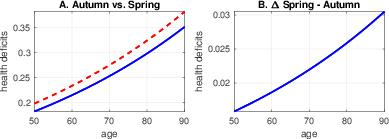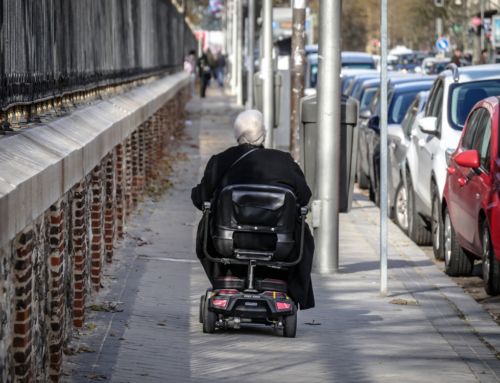We investigate how the season of birth affects human health and aging. Forthis purpose, we use five waves of the Survey of Health, Aging, and Retirement in Europe (SHARE) dataset and construct a health deficit index for 21 European countries. Results from log-linear regressions suggest that, on average, elderly European men age faster when they were born in spring and summer (compared to autumn). The bulk of the season effect is neither mediated through body height nor through education.
The last decades of epidemiological research have provided mounting evidence that environmental conditions early in life, and in particular during the period of gestation, have a significant impact on the development of diseases later in life. While the original studies focused on cardiovascular diseases there is now evidence of “fetal origins” of a wide spectrum of chronic and aging-related diseases. A natural way to test the fetal origins hypothesis is to investigate the impact of exposure to shocks in utero on late life outcomes, a literature to which increasingly economists contribute.
A particularly mild “shock” is the time of birth itself, which may, for example, influences fetal development through access to nutrition like fresh fruits and vegetables, or the exposure to sunlight and UV-B radiation. In a recent study we contributed to this literature by investigating the impact of season of birth to an aggregate, encompassing measure of health and aging, the health deficit index. This index counts the number of health deficits that a person has at a given age relative to a large number of potential health deficits.
In contrast to most of the available literature on cross-sections in specific countries, we investigate elderly individuals from a panel of countries observed over time. This allows us to focus on the aging process, understood as the accumulation of new health deficits, and to control for country- and year-of-birth fixed effects. Specifically, we used the Survey of Health, Aging and Retirement in Europe (SHARE) and collected health deficits for men and women above age 50 from 21 European countries.
In log-linear regression we find that health deficits increase by about 2% per year of age for women and by about 3% for men. In line with the earlier literature we thus find that men are aging faster than women. With respect to the time of birth, we find that men born in spring or summer age significantly faster than men born in autumn. At any given age, spring born men had developed about 3.5 percent more health deficits than autumn born men. For women, we do not find a significant season-of-birth effect. When we split the sample, we find no significant season-of-birth effect for Southern European countries. For Northern European countries, where the seasonal variation of sunlight is larger, we obtain a larger season-of-birth effect. At given age, Northern European men born in spring have developed on average 8.5 percent more health deficits than men born in autumn.
The Figure below illustrates this finding. In the panel on the left hand side, the blue line shows the health deficit index of autumn born men at a given age; the red line shows health deficits accumulated by spring born men of the same age. The panel on the right shows that the difference in the health deficit index of spring- and autumn-born men increases with age. This means that spring born men are not only less healthy, they also age faster than autumn born men.

The finding of fetal origins contradicts the conventional life cycle model in health economics, the so-called health capital model, which predicts that early-life health differences are depreciated away as individuals age. It is supportive of the health deficit model developed by Dalgaard and Strulik (Optimal aging and death: understanding the Preston curve. Journal of the European Economic Association, 2014, Vol 12(3), 672-701), which predicts that small differences in initial health differences lead to large and increasing health differences late in life. The result that only male health is affected by the season of birth is consistent with the notion that males are in general more responsive to adverse environmental conditions in early life. As an explanation, it has been proposed that boys grow faster than girls in the womb, such that the relatively smaller placenta provides less buffer capacity to nutritional shocks experienced by the mother.
About the authors:
Abeliansky, Ana Lucia, University of Göttingen, Department of Economics, Platz der Göttinger Sieben 3, 37073 Göttingen, Germany
Strulik, Holger, University of Göttingen, Department of Economics, Platz der Göttinger Sieben 3, 37073 Göttingen, Germany
The article is based on:
Abeliansky, A., & Strulik, H. (2018). Season of birth, health and aging. Economics and Human Biology, 2020, Vol. 36, 100812. DOI: https://doi.org/10.1016/j.ehb.2019.100812











Leave A Comment